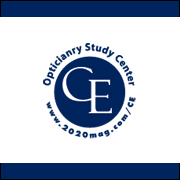Glaucoma Care on the Cutting Edge
Read PDF Edition
We
are excited to bring you the Proceedings
from
the Seventh Annual Meeting of the Optometric
Glaucoma Society (OGS), held in Anaheim,
Calif., October
20 to 22, 2008.This year’s meeting
ran over three days,including the joint session
with the Glaucoma Progression Scholars, an
affiliation
of researchers and clinicians with a
common
interest in glaucoma progression.
In this year’s program, we covered a wide spectrum of topics, yet focused on what is new and cutting edge in each. Topics included epidemiology of glaucoma, patient communication, the relationship between visual fields and everyday functioning, and expanding uses of optical coherence tomography.
Other lectures discussed how determining patients’ rates of progression might help one identify those at risk of visual loss. Researchers also discussed the apparent dissociation between structural and functional progression. The 2008 Honoree, Robert Ritch, MD, FACS, FRCOphth, in his lecture “Exfoliation Syndrome: Beyond the Eye,” explained how exfoliation syndrome (XFS) is a systemic disorder, with glaucoma as the ocular manifestation. XFS is increasingly associated with cardiovascular and cerebrovascular diseases as well as other systemic disorders, such as Alzheimer’s disease. Dr. Ritch also discussed milestone research that showed that two common single nucleotide polymorphisms are associated with XFS and exfoliative glaucoma.
In the 2008 President’s Lecture, Theodore Krupin, MD, explained how the definition of glaucoma has evolved so that elevated intraocular pressure no longer represents glaucoma itself, but is just one risk factor. Population-based studies suggest that low-pressure glaucoma represents some 20% to 39% of cases of open-angle glaucoma in the United States. Dr. Krupin also offers an update on the Low-Pressure Glaucoma Treatment Study (LoGTS), a triple-masked randomized trial that will compare the efficacy of brimonidine vs. timolol to alter the course of low-pressure glaucoma as measured by the rate of progression of visual field loss.
I would like to thank the speakers who took time from their busy schedules to share their wisdom with members and guests. I would especially like to thank Brad Fortune, OD, PhD, 2008 OGS Program Chair, as well as John McSoley, OD, and Michael Sullivan-Mee, OD, 2008 meeting co-chairs. I would also like to thank John Flanagan,MCOptom,PhD, OGS President for his consulting in the development of this supplement as well as his input in planning the meeting. Thanks go to Jeffrey S. Eisenberg, managing editor of Review of Optometry, who distilled these complex lectures into the articles that follow, and to Martha Slawek, who handled the graphic design.
Finally,I would like to thank Pfizer, Inc. (Ravi Pherwani, Dennis Kowalski, Jill Burdge, Tom Wright, Karen Fixler), for their support of the OGS meeting and, in particular, for providing an unrestricted grant that allowed us to produce this supplement. Please visit the OGS Web site, www.optometricglaucomasociety.org, and check out our quarterly e-journal that can be sent to your e-mail account free of charge. I hope you enjoy this supplement and find it useful.
-Murray Fingeret, OD; Executive Vice-President, Optometric Glaucoma Society; Editor, Proceedings of the Seventh Annual Scientific Meeting of the Optometric Glaucoma Society
In this year’s program, we covered a wide spectrum of topics, yet focused on what is new and cutting edge in each. Topics included epidemiology of glaucoma, patient communication, the relationship between visual fields and everyday functioning, and expanding uses of optical coherence tomography.
Other lectures discussed how determining patients’ rates of progression might help one identify those at risk of visual loss. Researchers also discussed the apparent dissociation between structural and functional progression. The 2008 Honoree, Robert Ritch, MD, FACS, FRCOphth, in his lecture “Exfoliation Syndrome: Beyond the Eye,” explained how exfoliation syndrome (XFS) is a systemic disorder, with glaucoma as the ocular manifestation. XFS is increasingly associated with cardiovascular and cerebrovascular diseases as well as other systemic disorders, such as Alzheimer’s disease. Dr. Ritch also discussed milestone research that showed that two common single nucleotide polymorphisms are associated with XFS and exfoliative glaucoma.
In the 2008 President’s Lecture, Theodore Krupin, MD, explained how the definition of glaucoma has evolved so that elevated intraocular pressure no longer represents glaucoma itself, but is just one risk factor. Population-based studies suggest that low-pressure glaucoma represents some 20% to 39% of cases of open-angle glaucoma in the United States. Dr. Krupin also offers an update on the Low-Pressure Glaucoma Treatment Study (LoGTS), a triple-masked randomized trial that will compare the efficacy of brimonidine vs. timolol to alter the course of low-pressure glaucoma as measured by the rate of progression of visual field loss.
I would like to thank the speakers who took time from their busy schedules to share their wisdom with members and guests. I would especially like to thank Brad Fortune, OD, PhD, 2008 OGS Program Chair, as well as John McSoley, OD, and Michael Sullivan-Mee, OD, 2008 meeting co-chairs. I would also like to thank John Flanagan,MCOptom,PhD, OGS President for his consulting in the development of this supplement as well as his input in planning the meeting. Thanks go to Jeffrey S. Eisenberg, managing editor of Review of Optometry, who distilled these complex lectures into the articles that follow, and to Martha Slawek, who handled the graphic design.
Finally,I would like to thank Pfizer, Inc. (Ravi Pherwani, Dennis Kowalski, Jill Burdge, Tom Wright, Karen Fixler), for their support of the OGS meeting and, in particular, for providing an unrestricted grant that allowed us to produce this supplement. Please visit the OGS Web site, www.optometricglaucomasociety.org, and check out our quarterly e-journal that can be sent to your e-mail account free of charge. I hope you enjoy this supplement and find it useful.
-Murray Fingeret, OD; Executive Vice-President, Optometric Glaucoma Society; Editor, Proceedings of the Seventh Annual Scientific Meeting of the Optometric Glaucoma Society
Additional Publications
-
Annual Contact Lenses and Lens Care Guide-2022
Hear from several experts, including Miguel A. Busquets, MD, Carolyn Majcher, OD, and Mary Anne C. Murphy, OD, about how to manage geographic atrophy using modern-day tools, technology, treatments and knowledge.
Sponsored by Apellis Pharmaceuticals Inc and Carl Zeiss Meditec USA, Inc Clinical Perspectives on Patient Care
Digital Devices are Impacting Your Patients
Opthalmic Product Guide
Practical Matters in Myopia Management
Innovations in Glaucoma Care & Treatment



